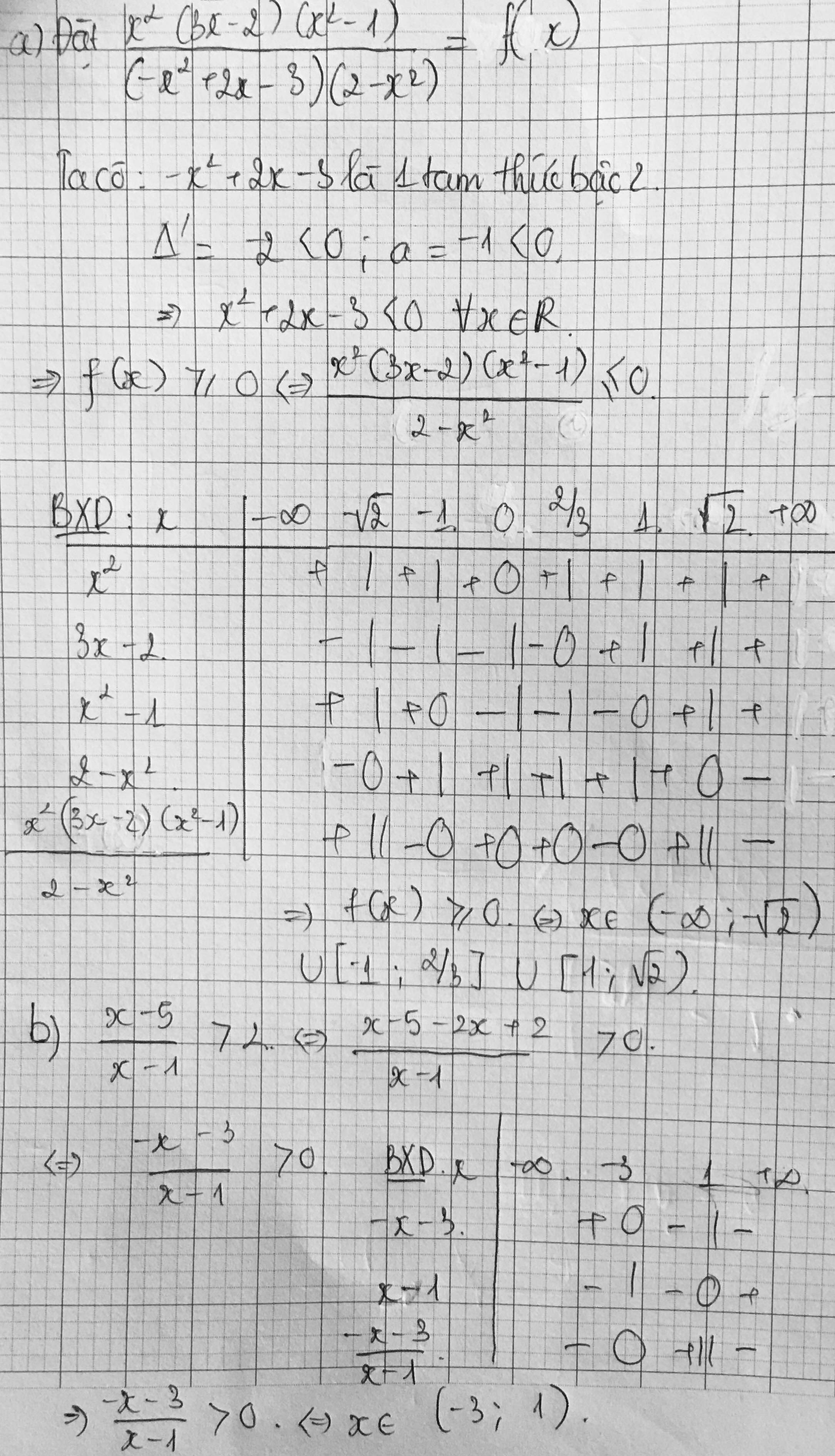Hãy nhập câu hỏi của bạn vào đây, nếu là tài khoản VIP, bạn sẽ được ưu tiên trả lời.

Điều kiện xác định :\(x\ne-1\)
Ta có : \(\left(2+\sqrt{3}\right)\left(2-\sqrt{3}\right)=1\Rightarrow\left(2-\sqrt{3}\right)=\left(2+\sqrt{3}\right)^{-1}\)
\(\Rightarrow\) Bất phương trình : \(\left(2+\sqrt{3}\right)^{x-1}\ge\left(2+\sqrt{3}\right)^{\frac{1-x}{x+1}}\)
\(\Leftrightarrow x-1\ge\frac{1-x}{x+1}\)
\(\Leftrightarrow\frac{\left(x-1\right)\left(x+2\right)}{x+1}\ge0\)
\(\Leftrightarrow\left[\begin{array}{nghiempt}-2\le x< -1\\x\ge1\end{array}\right.\)
Vậy bất phương trình có tập nghiệm là \(S=\)[ -2; -1) \(\cup\) [1; \(+\infty\))


\(\begin{cases}3xy\left(1+\sqrt{9y^2+1}\right)=\frac{1}{\sqrt{x+1}-\sqrt{x}}\left(1\right)\\x^3\left(9y^2+1\right)+4\left(x^2+1\right)\sqrt{x}=10\left(2\right)\end{cases}\)
Điều kiện \(x\ge0\)
Nếu x=0, hệ phương trình không tồn tại
Vậy xét x>0
\(\Leftrightarrow3y+3y\sqrt{9y^2+1}=\frac{\sqrt{x+1}+\sqrt{x}}{x}\)
\(\Leftrightarrow3y+3y\sqrt{\left(3y\right)^2+1}=\frac{1}{\sqrt{x}}+\frac{1}{\sqrt{x}}\sqrt{\left(\frac{1}{\sqrt{x}}\right)^2+1}\) (3)
Từ (1) và x>0 ta có y>0. Xét hàm số \(f\left(t\right)=t+t.\sqrt{t^2+1},t>0\)
Ta có \(f'\left(t\right)=1+\sqrt{t^2+1}+\frac{t^2}{\sqrt{t^2+1}}>0\). Suy ra \(f\left(t\right)\) luôn đồng biến trên \(\left(0;+\infty\right)\)
Phương trình (3) \(\Leftrightarrow f\left(3y\right)=f\left(\frac{1}{\sqrt{x}}\right)\Leftrightarrow3y=\frac{1}{\sqrt{x}}\)
Thế vào phương trình (2) ta được : \(x^3+x^2+4\left(x^2+1\right)\sqrt{x}=10\)
Đặt \(g\left(x\right)=x^3+x^2+4\left(x^2+1\right)\sqrt{x}-10,x>0\)
Ta có \(g'\left(x\right)>0\) với \(x>0\) \(\Rightarrow g\left(x\right)\) là hàm số đồng biến trên khoảng (\(0;+\infty\))
Ta có g(1)=0
vậy phương trình g(x) = 0 có nghiệm duy nhất x = 1
Với x=1 => \(y=\frac{1}{3}\)
Vậy kết luận : Hệ có nghiệm duy nhất (\(1;\frac{1}{3}\))



Điều kiện : \(x\ge1\)
\(3\left(x^2-2\right)+\frac{4\sqrt{2}}{\sqrt{x^2-x+1}}>\sqrt{x}\left(\sqrt{x-1}+3\sqrt{x^2-1}\right)\) \(\Leftrightarrow6\left(x^2-2\right)+\frac{8\sqrt{2}}{\sqrt{x^2-x+1}}-2\sqrt{x^2-x}-6\sqrt{x}\sqrt{x^2-1}>0\)
\(\Leftrightarrow3\left(\sqrt{x^2-1}-\sqrt{x}\right)^2+\left(\sqrt{x^2-x}-1\right)^2+2\left(\frac{4\sqrt{2}}{\sqrt{x^2-x}+1}+x^2-x-5\right)>0\)
Xét hàm số \(f\left(t\right)=\frac{4\sqrt{2}}{\sqrt{t+1}}+t-5,\left(t\ge0\right)\)
Ta có \(f'\left(t\right)=1-\frac{2\sqrt{2}}{\left(t+1\right)\sqrt{t+1}}\)
\(f'\left(t\right)=0\Leftrightarrow t=1\)
Bảng xét dấu :
Suy ra \(f\left(t\right)\ge f\left(1\right)\), với mọi \(t\in\left[0;+\infty\right]\)\(\Rightarrow\) \(f\left(t\right)\ge0\), với mọi \(t\in\left[0;+\infty\right]\). Dấu = xảy ra \(\Leftrightarrow t=1\)
Do \(x^2-x\ge0\) với mọi \(x\in\left[0;+\infty\right]\)\(\Rightarrow\frac{4\sqrt{2}}{\sqrt{x^2-x+1}}+x^2-x-5\ge0\) với mọi \(x\in\left[0;+\infty\right]\), dấu = xảy ra khi \(x^2-x=1\Leftrightarrow x=\frac{1+\sqrt{5}}{2}\)
Khi đó \(3\left(\sqrt{x^2-1}-\sqrt{x}\right)^2+\left(\sqrt{x^2-1}-1\right)^2+2\left(\frac{4\sqrt{2}}{\sqrt{x^2-1}+1}+x^2-x-5\right)>0\)
\(\Leftrightarrow\begin{cases}\sqrt{x^2-1}-\sqrt{x}\ne0\\\sqrt{x^2-x}-1\ne0\\\frac{4\sqrt{2}}{\sqrt{x^2-x+1}}+x^2-x-5\ne0\end{cases}\) \(\Leftrightarrow x\ne\frac{1+\sqrt{5}}{2}\)
Tập nghiệm của bất phương trình đã cho là
\(S=\left(1;+\infty\right)\backslash\left(\frac{1+\sqrt{5}}{2}\right)\)